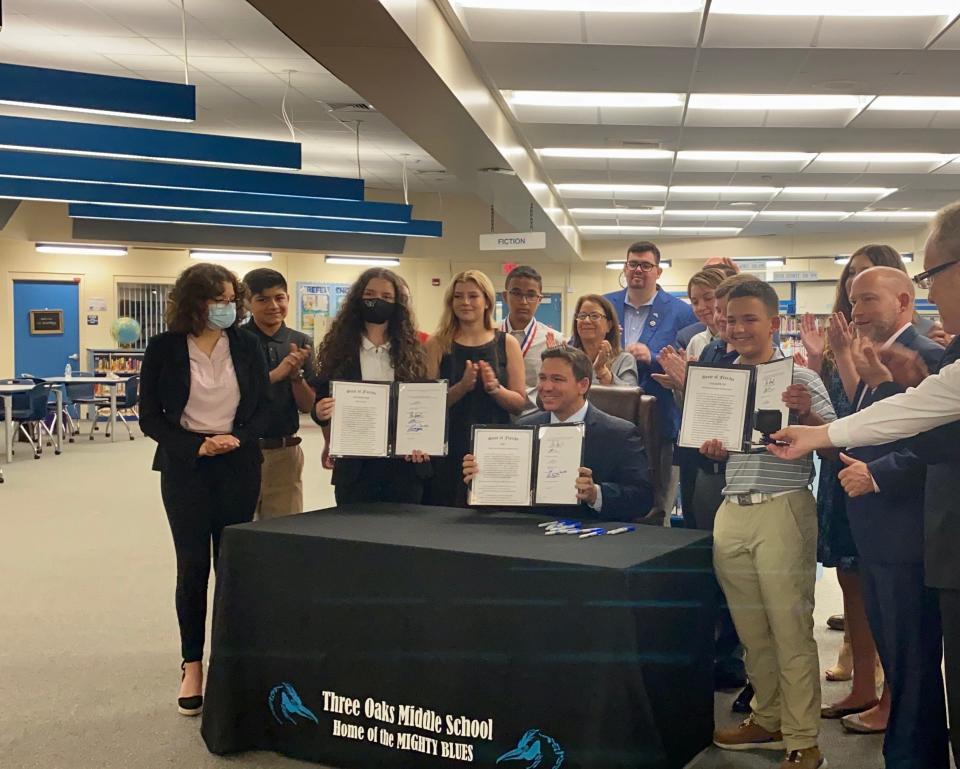Gov. Ron DeSantis signs education bills on 'viewpoint diversity,' new civics curriculum in Florida
Gov. Ron DeSantis signed three education bills Monday that direct how civics is taught in Florida public schools and universities, including one bill that seeks to assess "viewpoint diversity" on college campuses.
The three bills — House Bill 5, House Bill 233 and Senate Bill 1108 — target how civics education and debate topics will be discussed from kindergarten through higher education.
"We obviously want our universities to be focused on critical thinking, academic rigor," DeSantis said during a news conference at Three Oaks Middle School in Fort Myers. "We do not want them as basically hotbeds for stale ideology."
In case you missed it: Florida Board of Education approves new academic standards opposing Critical Race Theory

The bill that has drawn the most attention is H.B. 233, which directs Florida's public universities to conduct annual assessments on intellectual freedom and "viewpoint diversity."
DeSantis challenged how public universities and colleges conduct debate and teachings, saying parents worry students will be "indoctrinated."
"It used to be thought that a university campus was a place where you'd be exposed to a lot of different ideas," DeSantis said. "Unfortunately, now the norm is really these are more intellectually repressive environments."
A survey adopted by the State Board of Education or the Board of Governors of the State University System will be used to evaluate freedoms related to speech on campuses, according to the bill.
The bill also prohibits universities and colleges from “shielding students, faculty, or staff from certain speech”.
At the bill signing, state Sen. Ray Rodrigues, R-Estero, echoed DeSantis on how the bill will stop "indoctrination".
"The bedrock of higher education has traditionally been freedom of speech, viewpoint diversity, and the ability to have academic freedom," Rodrigues said. "Across the country, those bedrocks are crumbling on higher education campuses with this bill."
Rodrigues led the bill through the Senate.
Last week, the Florida Board of Education adopted new rules limiting the teaching of history with a primary focus of banning critical race theory and limiting other race-related discussions from classrooms.
DeSantis spearheaded the push to ban the academic approach to systemic racism that dates back more than 40 years.
"We do not want curriculum that is judging students based on their race, and we do not want false history," DeSantis said.
Florida is one of more than a dozen states that have considered rules to prevent teachers from using critical race theory in their lessons.
In a statement issued after DeSantis signed the bill, Progress Florida Executive Director Mark Ferrulo said DeSantis and Republican lawmakers are manufacturing "fake controversies."
“Floridians still believe in an American Dream that celebrates the successes of our country without focusing on distractions that seek to divide us instead of allowing all students the freedom to learn and understand other cultures and experiences," Ferrulo said.
H.B. 5, known as the "Portraits of Patriotism Act," tasks Florida's Department of Education to develop civics curriculum that will include lessons on the "evils" of communist and totalitarian regimes.
DeSantis condemned how some colleges and universities discuss communist leaders and ideologies.
Mao Zedong, a Chinese communist revolutionary, is spoken of "positively" on college campuses and Che Guevara, a Cuban revolutionary, is celebrated on shirts, he said.
"This guy was a total communist thug and yet that's the kind of environment that you see," DeSantis said. "And so I think by us having this, we're really going to be, I think pushing back against some of the whitewashing that's been done."
More: What we know about the critical race theory controversy, impact on education
S.B. 1108 seeks "to build bridges civics education between our high schools and post-secondary institutions," DeSantis said.
State college and university students will be required to take an assessment in addition to a civics literacy course as a graduation requirement. Currently, college students are only required to complete one.
The bill further requires high school students to take a civics assessment prior to graduation, DeSantis said.
The high school assessment doesn't have high stake consequences, he said. If students pass the civics test, they will be waived from the post-secondary assessment.
In 2019, DeSantis announced a plan for a civics exam closely resembling the test to become a naturalized U.S. citizen.
DeSantis has previously stated that he wants Florida to be considered "No.1" in civics literacy across the country.
In January 2019, DeSantis issued an executive order calling for a complete overhaul of Florida's education standards, which included eliminating Common Core, a set of education standards from 2010.
DeSantis and the state Department of Education shifted a focus to civics learning shortly thereafter.
Rachel Fradette is an education reporter for the Naples Daily News. Follow her on Twitter: @Rachel_Fradette, email her at rfradette@gannett.com.
This article originally appeared on Naples Daily News: Gov. Ron DeSantis signs three education, civics bills in Florida

 Yahoo Movies
Yahoo Movies 